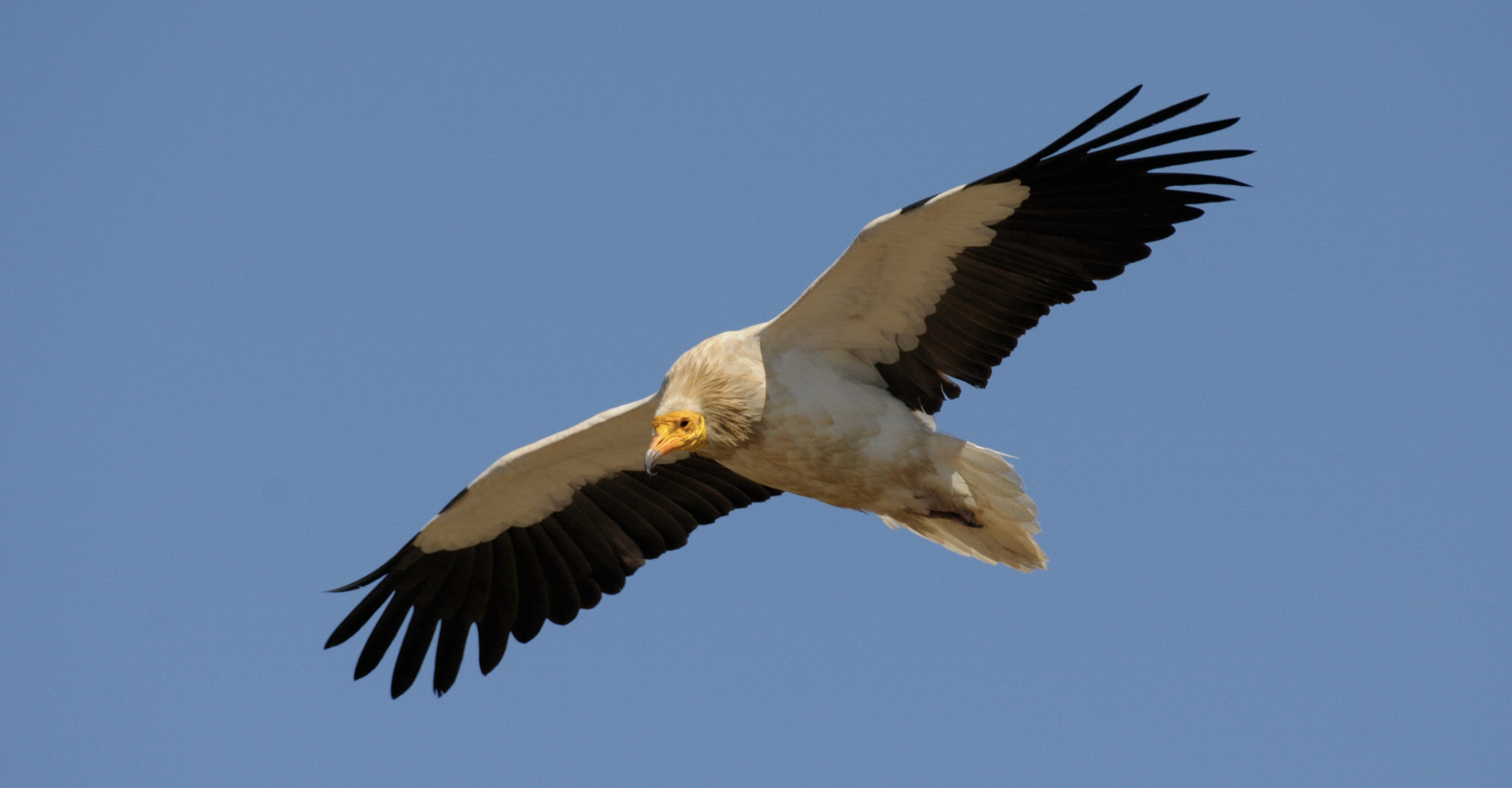
The migratory Egyptian Vulture is unfortunately considered Endangered at a global level. It has lost half of its population in the last three generations, but conservation initiatives are fighting to protect it, and some populations in Europe are now stabilised. Here is the breakdown of this year’s Egyptian Vulture conservation highlights that we were involved in.
LIFE Rupis

The LIFE Rupis conservation project, led by Portuguese wildlife organisation Sociedade Portuguesa para o Estudo das Aves (SPEA), and funded by the European Union’s LIFE Fund and the MAVA Foundation, is working in the cross-border Douro region of Spain and Portugal to protect and strengthen the populations of Egyptian vultures and Bonelli´s eagle. With around 135 breeding pairs, the region has one of the largest population of Egyptian vultures in Europe. Creating a network of feeding stations, improving habitat and nesting sites as well as tackling the major threats of electrocution from electricity pylons and illegal wildlife poisoning, the LIFE Rupis project will strengthen the population and improve breeding rates.
This year, the VCF provided four GPS tags for Egyptian Vultures in the Douro, two of which were tagged in the nest. Egyptian Vultures are classified as endangered and are the only species of Europe’s four vulture species that have a globally declining population. The tracking data is vital to help understand what measures can be implemented to help protect the species, and understand how they move across the whole of the migratory flyway to identify any risks they may encounter and take action.
Faia and Rupis, Egyptian Vultures from the Douro Canyon, successfully made it to their wintering grounds in Mali and Senegal, and are being tracked with the GPS transmitters fitted as part of the project. Also Arribas, a juvenile bird tagged this year in the nest made it successfully to Africa.

Egyptian Vultures from Italy
Our Italian colleagues released a total of eight captive-bred Egyptian Vultures in Basilicata between July and August. CERM Association Centro Rapaci Minacciati and ISPRA Istituto Superiore per la Protezione e la Ricerca Ambientale carried out these releases as part of theLIFE Egyptian Vulture project to support the Italian population of this species, which dramatically dropped over the last few years. The vultures were equipped with satellite transmitters to monitor their movements and tackle threats. The Vulture Conservation Foundation provided four of these transmitters to follow the movements of the vultures.
Track the movements of the tagged birds by visiting our online public maps.
Research
Data from 94 GPS-tracked Egyptian Vultures, contributed by 40 authors from 31 organisations, contributed to our newest scientific publication: Spatial and Temporal Variability in Migration of a Soaring Raptor Across Three Continents (Frontiers in Ecology and Evolution, 2019).
The study reveals amazing flexibility of migration among Egyptian Vultures as well as their exposure to threats in over 40 countries along their migratory routes – a milestone for Egyptian Vulture research.
Some insights from the study:
- The birds breeding in Spain and France had the shortest migration whereas the birds breeding on the Balkan peninsula travelled roughly 2000 km more.
- Some Egyptian Vultures can make the fantastic journey of up to 10,983 km
- Birds breeding on one part of Europe winter in the same part of Africa. Birds from western Europe wintered in western Africa, and birds from eastern Europe in eastern Africa or the Arabian peninsula.
- Their broad distribution presents real challenges for the conservation of the species since threats vary by country. For example, in the Middle East, they get persecuted, whereas, in Nigeria, they are sold in markets for belief-based use.
This study was all thanks to the collaborative effort of Louis Phipps (VCF’s Research Officer), Steffen Oppel, Pascual Lopez-Lopez and Evan Buechley, who are co-lead authors of this paper.
Learn about the 2019 conservation highlights of the other European vulture species:
Thank you for your continuous support. You can donate to the Vulture Conservation Foundation and help us continue our conservation work, protecting Europe’s vultures.


